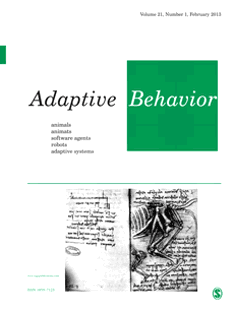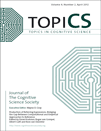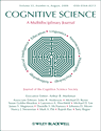
Cognitive Systems Research
Scope & Guideline
Transforming Knowledge into Cognitive Solutions
Introduction
Aims and Scopes
- Cognitive Architectures:
Research on models that simulate human cognitive processes, including memory, learning, and reasoning, to create intelligent systems capable of complex decision-making. - Emotion Modeling:
Exploration of how emotions can be represented and processed in artificial agents, facilitating more human-like interactions and empathetic responses. - Human-Agent Interaction:
Studies focusing on improving the interaction between humans and intelligent agents, including conversational agents, robots, and virtual environments. - Neuroscience-Inspired Approaches:
Utilization of principles from neuroscience to inform the design and implementation of cognitive models and systems, enhancing their functionality and performance. - Machine Learning and AI Integration:
Integration of advanced machine learning techniques with cognitive models to enhance the adaptability and learning capabilities of artificial systems. - Simulation and Virtual Environments:
Research on the use of simulations, including virtual reality, to study cognitive processes and train intelligent systems in realistic scenarios.
Trending and Emerging
- Autonomous Agents with Emotional Intelligence:
There is an increasing focus on developing autonomous agents that can understand and respond to human emotions, enhancing their interaction quality and usability in real-world applications. - Human-Centric AI Design:
Research is trending towards designing AI systems that prioritize human experience and interaction, emphasizing user-centered approaches in the development of cognitive systems. - Multimodal Communication Systems:
Emerging work is exploring how cognitive systems can utilize multiple forms of communication (e.g., visual, auditory, textual) to create more effective and engaging interactions with users. - Cognitive Robotics:
The integration of cognitive processes into robotics is gaining traction, with studies focusing on how robots can learn from and adapt to their environments in human-like ways. - Neurosymbolic AI:
A growing interest in combining neural networks with symbolic reasoning approaches is evident, aiming to enhance the cognitive capabilities of artificial systems and improve their understanding of complex tasks.
Declining or Waning
- Traditional Cognitive Modeling Techniques:
Methods that relied heavily on rule-based systems or simplistic cognitive models appear to be less frequently addressed, as the field moves toward more complex, data-driven approaches. - Basic Emotion Recognition:
Research focused solely on basic emotion recognition without considering contextual and nuanced emotional interactions is becoming less common, as the field increasingly values comprehensive modeling of emotional intelligence. - Static Knowledge Representation:
The exploration of static models of knowledge representation is waning, with a growing preference for dynamic, adaptable systems that can learn and evolve over time. - Overly Simplistic AI Ethics Discussions:
Discussions surrounding AI ethics that do not engage deeply with the complexities of human cognition and social interaction are seeing reduced emphasis, as the field seeks more robust ethical frameworks. - Narrow Domain Applications:
Research focusing on narrow, domain-specific applications of cognitive systems without broader implications for general intelligence or human-like reasoning is declining in favor of more integrative approaches.
Similar Journals

Cognitive Computation and Systems
Transforming Ideas into Algorithms for a Smarter Future.Cognitive Computation and Systems is an innovative open-access journal published by Wiley, dedicated to advancing the fields of Artificial Intelligence, Cognitive Neuroscience, and Computer Science Applications. Based in the United Kingdom, this journal has established itself as a key resource for researchers, students, and professionals alike since its inception in 2019. With a focus on the convergence of cognitive theories and computational methodologies, Cognitive Computation and Systems aims to publish high-quality research that bridges holistic cognitive processing with algorithmic design. Although the journal is currently categorized in the lower quartiles of its fields, it provides a unique platform for disseminating pioneering ideas that can drive the vital intersection of computer vision, pattern recognition, and psychology. Scholars can take advantage of its open-access model, ensuring that research findings are freely available, thus promoting wider knowledge sharing and collaboration within these rapidly evolving domains. With its ambitious scope and commitment to quality, this journal is poised to make a significant impact in its respective fields.

JOURNAL OF COGNITIVE NEUROSCIENCE
Unlocking the mysteries of the mind.Welcome to the JOURNAL OF COGNITIVE NEUROSCIENCE, a premier publication in the field of cognitive neuroscience, published by the esteemed MIT PRESS. Since its inception in 1989, this journal has been at the forefront of advancing our understanding of the neural mechanisms underlying cognitive processes, boasting an impressive convergence period through 2024. With its Q1 ranking in the 2023 cognitive neuroscience category, it stands out among 115 peers, indicating its critical role in shaping contemporary research. The journal offers a comprehensive array of research articles, reviews, and methodologies aimed at researchers, professionals, and students alike, facilitating the exploration of complex cognitive functions. While not an open-access journal, it provides essential insights and significant contributions to the neuroscience community, making it an invaluable resource for anyone keen on delving into the intricacies of the human brain.

ADAPTIVE BEHAVIOR
Innovating Understanding of Human and Artificial AdaptationADAPTIVE BEHAVIOR is a renowned academic journal published by SAGE PUBLICATIONS LTD, dedicated to advancing the understanding of adaptive mechanisms in behavior across a spectrum of disciplines. With a focus on Artificial Intelligence, Behavioral Neuroscience, and Experimental and Cognitive Psychology, this journal aims to facilitate the dissemination of innovative research and theoretical advancements that relate to adaptive behaviors in both humans and artificial systems. The journal, which spans from 1992 to 2024, holds a commendable position within its field, ranked in the Q3 category for multiple categories, and Q1 in Philosophy. Furthermore, it is recognized within Scopus rankings, ensuring its impact and relevance in the academic community, with a notable rank of #57 in Experimental Psychology and #49 in Behavioral Neuroscience. While ADAPTIVE BEHAVIOR does not currently offer Open Access options, it maintains a vital role in bridging disciplines and fostering discourse among researchers, professionals, and students who are exploring the complexities of behavior in adaptive systems.

MIND & LANGUAGE
Fostering Scholarly Dialogue on Mind and LanguageMIND & LANGUAGE, published by WILEY, is a premier academic journal that has established itself as a leading platform for interdisciplinary research at the intersection of linguistics, philosophy, and cognitive science. With a noteworthy impact factor and a remarkable ranking in the top quartiles (Q1) for both Linguistics and Language as well as Philosophy, it reflects the journal’s robust contribution to the academic community, garnering attention from researchers and scholars worldwide. Since its inception in 1986, MIND & LANGUAGE has provided an avenue for exploring the complexities of language perception, cognitive processes, and the philosophical implications of linguistic studies. Its comprehensive scope ensures that it remains a critical resource for professionals and students alike who are engaged in the exploration of language's role in human thought and society. The journal's rigorous peer-review process guarantees the high quality and scholarly integrity of the published work, making it an essential addition to any academic library.

Topics in Cognitive Science
Innovating Insights into Human Thought and BehaviorTopics in Cognitive Science, published by WILEY, is a premier interdisciplinary journal that advances the understanding of the cognitive processes that underpin human behavior and interaction with technology. With a commendable impact factor and a strong focus on research from 2009 to 2024, this journal garners significant attention in various subfields, as evidenced by its Q1 ranking in Experimental and Cognitive Psychology and Linguistics and Language, alongside a Q2 position in Artificial Intelligence, Cognitive Neuroscience, and Human-Computer Interaction. Researchers and professionals will find invaluable insights into the latest experimental findings, theoretical discussions, and practical applications that bridge cognitive neuroscience, psychology, and computer science. Topics in Cognitive Science is especially pivotal for those aiming to delve deeper into cognitive mechanisms and their implications within our increasingly digital world, making it an essential resource for students and scholars alike.

Wiley Interdisciplinary Reviews-Cognitive Science
Connecting theories and practices in cognitive research.Wiley Interdisciplinary Reviews-Cognitive Science (ISSN: 1939-5078, E-ISSN: 1939-5086), published by WILEY, stands as a premier academic journal dedicated to advancing the understanding of cognitive science through an interdisciplinary approach. Since its inception in 2010, the journal has rapidly established itself as a leading source of knowledge, achieving a Q1 ranking in the 2023 category of Medicine, Neuroscience, and Psychology, underscoring its significant impact within these fields. With a Scopus ranking of #27 in General Psychology and #30 in General Neuroscience, it offers researchers, professionals, and students access to cutting-edge research that bridges various disciplines, fostering collaboration and innovation. Though not openly accessible, this journal is critical for those aiming to stay at the forefront of cognitive science research, providing comprehensive reviews that synthesize emerging findings and highlight future directions for study.

MINDS AND MACHINES
Pioneering Research in AI and Philosophical ThoughtMINDS AND MACHINES is a distinguished peer-reviewed journal published by Springer, specializing in the interdisciplinary realms of Artificial Intelligence and Philosophy. Founded in 1991, this journal continues to serve as a critical forum for exploring the intricate relationships between human cognition, artificial systems, and ethical considerations in technology. With an impressive impact factor positioned in the Q1 quartile for both the fields of Artificial Intelligence and Philosophy, MINDS AND MACHINES ranks as a top-tier publication, reflecting its significant contributions to ongoing scholarly discussions. The journal is indexed in Scopus, where it holds the number one rank in Philosophy within the Arts and Humanities category, and the 42nd position in the Computer Science segment for Artificial Intelligence, demonstrating its wide-reaching influence and high citation impact. Although it does not offer open access, its rigorous selection process ensures that only high-quality manuscripts are published, making it an essential read for researchers, professionals, and students aiming to stay at the forefront of developments in these rapidly evolving fields.

Cognitive Processing
Fostering collaborative insights in cognitive research.Cognitive Processing, published by SPRINGER HEIDELBERG in Germany, is a leading journal dedicated to advancing the understanding of cognitive processes through interdisciplinary research. With its ISSN 1612-4782 and E-ISSN 1612-4790, the journal covers a diverse range of fields including Artificial Intelligence, Cognitive Neuroscience, and Experimental and Cognitive Psychology, making it an invaluable resource for researchers and professionals alike. While it currently does not operate under an Open Access model, it is well-regarded within the academic community, holding a respectable impact factor and ranking in the Q2 and Q3 quartiles as of 2023. The journal aims to foster innovation and collaboration among scholars, presenting high-quality original research, reviews, and theoretical discussions that bridge the gap between cognitive science and its practical implications. With a convergence of research from 2005 to 2024, Cognitive Processing continues to play a critical role in the evolving landscape of cognitive science literature.

COGNITIVE SCIENCE
Innovating Insights in Cognitive ScienceCOGNITIVE SCIENCE, published by WILEY, is a leading academic journal that delves into the complexities of human cognition through an interdisciplinary lens. With an ISSN of 0364-0213 and an E-ISSN of 1551-6709, this journal has made significant strides in the field since its inception in 1977, ample coverage through to 2024, and a commendable Q1 and Q2 categorization in Experimental and Cognitive Psychology and Cognitive Neuroscience as of 2023. The journal is positioned at the intersection of various disciplines, ranking #65 out of 165 in Experimental and Cognitive Psychology and #58 out of 115 in Cognitive Neuroscience, highlighting its relevance and contribution to advancing knowledge in these areas. Although it does not offer open access, COGNITIVE SCIENCE remains an essential resource for researchers, professionals, and students seeking to explore groundbreaking research and theoretical insights within the vast domain of cognitive science.

International Journal of Cognitive Informatics and Natural Intelligence
Advancing Cognitive Systems for a Smarter TomorrowThe International Journal of Cognitive Informatics and Natural Intelligence, published by IGI Global, is an essential resource for researchers and professionals exploring the intersections of cognitive informatics, artificial intelligence, and human-computer interaction. Since its establishment in 2007, this journal has focused on advancing the understanding of cognitive systems and their applications in natural intelligence, contributing significantly to the fields of software engineering and interface design. Operating out of the United States, the journal aims to disseminate high-quality research and innovative methodologies to foster interdisciplinary collaboration. Despite its current standing in Q4 quartiles for the fields of Artificial Intelligence, Human-Computer Interaction, and Software, it serves as a vital platform for emerging scholars and seasoned professionals alike seeking to explore new frontiers in cognitive technologies. While it does not provide direct open access, these publications are instrumental in shaping academic discourse, and contribute to ongoing advancements in how we understand and integrate cognitive science into practical applications.